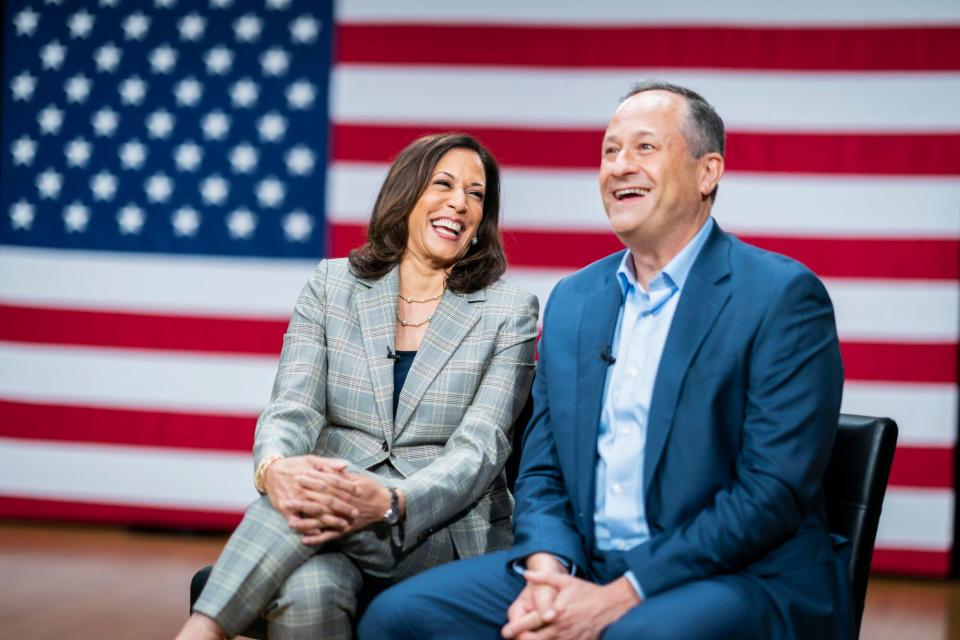Kamala Harris Reacts to Mocking Mispronunciations of Her Name: ‘It’s About Respect’

Kamala Harris Reacts to Mocking Mispronunciations of Her Name: ‘It’s About Respect’
Kamala Harris & Doug Emhoff open up about the difficulties of campaigning during the pandemic, how the couple stays connected despite the travel and stress of politics, and what they plan to do once the election is over.
It's happened more than once in this presidential campaign already steeped in talk of race and racism: a Republican with a microphone — Fox News' Tucker Carlson, or more recently, Georgia Sen. David Perdue — dismissively and exaggeratedly mispronounces Kamala Harris' first name.
"KAH-mah-lah? Kah-MAH-lah? Kamala-mala-mala? I don’t know. Whatever," Perdue, who has worked with Harris for three years in the U.S. Senate, said in his speech at a recent campaign rally for President Donald Trump. (His staff later said "he didn't mean anything by it.")
Speaking with PEOPLE in this week's issue, in her first interview with her husband since joining Joe Biden's ticket, the Democratic vice presidential candidate discusses the (mis)handling of her name. Then she pivots the personal to the political, turning to larger issues of racism and inequality.
"I think that the name that your parents gives you, whoever you are, meaning whatever your gender or race or background or language your grandmother speaks, is a very special thing," says Harris, 56. "Many cultures have naming ceremonies. It is a gift that is an incredible, familial gift. The family gives the child a name and so I come at it from that: not about myself, but for everyone ... Respect the names that people are given and use those names with respect."
The California senator makes a point to address people by their full name, she says.
"Sometimes my team will give me an acknowledgement card, the names of people to acknowledge at events and just their title and last name is there. And I'll always say, 'What's their full name?' " Harris says. "Maybe that comes from my own experience with my name, but I think names are very important."
"It's about respect," she tells PEOPLE, "and it's about respect for all that comes with a name."

Michael A. McCoy/Getty; Shutterstock Sen. Kamala Harris (left) and Sen. David Perdue

Adam Schultz/Biden for President From left: Kamala Harris and husband Doug Emhoff in Wilmington, Delaware, in August
As for so many others in the country, it's been an odd year for Harris and her husband, Doug Emhoff, who could make history in the Nov. 3 election.
The couple, both attorneys who met on a blind date in 2013 and married the next year, have mostly keep separate campaign schedules in order to cover more ground amid the novel coronavirus pandemic. Zoom-ing with PEOPLE from a tricked-out studio at Howard University, Harris’ alma mater, she and Emhoff, also 56, discuss what it's like to be on the trail now.
"There's nothing like people coming up to you and hugging you," says Harris, whose in-person rallies have involved social distancing and masks, "... so we're finding different ways to feel and see other."
If Biden and Harris, she would become the first woman, first Black and first Indian-American vice president.
Like many people of color in the U.S., Harris has had to navigate racism since she was a child. In a famous primary debate challenge to Biden last year, Harris referred to the days when, as a kindergartener in 1969, she was bused to a majority-white school north of her Berkley, California, home as part of desegregation efforts.

Adam Schultz/Biden for President Dr. Jill Biden, former Vice President Joe Biden, Sen. Kamala Harris and Doug Emhoff
"It was the only thing I knew," she says. "You take the bus and you go to school. Sadly, we're still looking at a moment in time... where American schools are deeply segregated, because they are segregated based on income."
Speaking with PEOPLE now, Harris says that it's time to "deal with the issue of race in America" and the issue of income inequality.
"Joe and I care about that with Title 1 funding and what we need to do to triple the funding for Title 1 schools," she says, "Knowing that all children should be nurtured and given the resources to meet their God-given capacity."
Both Harris and Emhoff are, as ever, trumpeting what has been one of Biden's main campaign pitches since he launched his bid in 2019.
"It's really an opportunity to talk about the contrast between the division and the hate that you're hearing," says Emhoff. "And then let's talk about Joe Biden and Kamala Harris, who are talking about unity and bringing us together."
"The issues impacting the American people right now are not issues that really are even bipartisan, they're nonpartisan," says Harris, who has faced scrutiny from Republicans as too "radical" and from progressives as too moderate.
"When you're talking about people standing in food lines, they're not standing in a line based on what party they're registered to vote with," she says.
She continues: "The challenges that we face as a country are clear. We must address them as American issues, not partisan issues, if we're going to actually heal and unify our country. I feel strongly about that."

 Yahoo Movies
Yahoo Movies 
